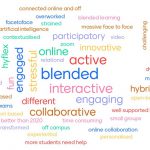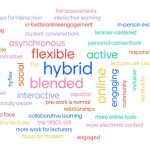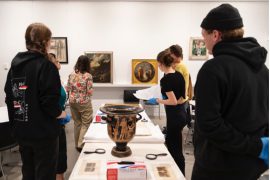What will ‘normal’ teaching look like in 2022 and beyond?
The challenge of balancing teaching for students who are either in Sydney or overseas will continue into the next semester and semester 1 next year. In many ways, the challenge is deepening, as the need to switch quickly between a more open campus activation and lockdown is realised and while the vaccination program is ongoing and national borders remain closed. Our aim is to transition over the next two semesters to a future COVID-adjusted world. This is one in which borders are open and we make the best possible use of in-person and online learning opportunities. Whilst we may still need to adapt quickly to change when required, our primary modes of teaching will be a richly blended on-campus mode wherever possible and, where appropriate for a student cohort, a high-quality online mode designed specifically for online learning.


As we make this transition, it is useful to base the future model of teaching on a shared philosophy and core set of principles for providing teaching and learning that reflects a distinctive education at Sydney and the best available evidence on effective approaches. These principles place the students at the centre and recognise the fundamental roles of educators in all teaching modes. They are based on:
- The overwhelmingly strong evidence for active learning and teaching approaches, which drastically improve student outcomes and significantly reduce achievement gaps for underrepresented students
- Our agreed educational and student experience strategies
- Our belief in the importance of educators and the relationship rich education reflected in worldwide trends on the role of technology
- The lessons learnt by educators and discussions with our students following the pandemic-inspired transformations of 2020 and 2021.
A shared educational philosophy
At Sydney, students learn in a diverse, inclusive and intellectually exciting environment where knowledge and skills are constructed through collaborative and interactive inquiry. This is facilitated by skilled and culturally responsive educators through both personalised and collaborative learning cycles of inquiry, feedback and assessment centred on authentic problem solving and tasks.
Implications for teaching delivery
Within this philosophy, core concepts are primarily taught through chunked content, for example:
- Asynchronously through digital resources such as short videos or podcasts, readings and guided tutorials interspersed with meaningful activities
- Synchronously through short periods of engaging delivery in face-to-face, online or HyFlex modes interspersed with meaningful activities
Core pedagogical principles
Seven core pedagogical principles should infuse our purposively designed learning, teaching, and assessment activities. Keeping these in mind when designing activities will help to ensure students’ experiences are supportive, constructive and culturally competent. These principles and some examples of how they intersect with the above in typical class types are:
- Build teacher-student relationships
- Foster a sense of belonging and community
- Have clear communications and expectations
- Measure and support engagement
- Use engaging approaches to content delivery
- Offer meaningful assessment, feedback and academic integrity
- Be human
Tell me more!
- Download the Principles guiding education at Sydney resource.
- 2021 EDUCAUSE Horizon Report: Learning and Teaching Edition
- Evidence for effective teaching approaches:
- The voices of our students:
- Peter Felten and Leo M. Lambert, Relationship-Rich Education: How Human Connections Drive Success in College, Johns Hopkins University Press, 2020
- Approaches for COVID-normal teaching






5 Comments